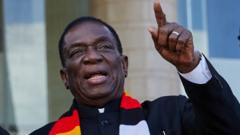In a swift transition, Mnangagwa has retired Lt Gen Anselem Sanyatwe from his position as army chief, reshuffling him into the ministerial role for sports, arts, and culture. Matatu, a 72-year-old liberation war veteran, steps into the role with expectations of loyalty to Mnangagwa and the current head of the Zimbabwe Defence Forces, Philip Valerio Sibanda, further consolidating military control to bolster political stability.
Reports suggest deepening unrest following a series of tensions within Zanu-PF, with factions of war veterans rallying for Vice-President Constantino Chiwenga to take the presidency instead of Mnangagwa, who has been nicknamed "The Crocodile" due to his feared political maneuvers. As Mnangagwa approaches the end of his second term in 2028, skepticism about his commitment to stepping down has prompted rising calls for accountability.
As authorities prepare for the demonstrations, security measures have tightened across the capital, with warnings against public participation in the protests. In the lead-up to these events, the atmosphere remains strained, reflecting both the historical legacy of the liberation struggle and current dissatisfaction with political leadership in Zimbabwe.
Reports suggest deepening unrest following a series of tensions within Zanu-PF, with factions of war veterans rallying for Vice-President Constantino Chiwenga to take the presidency instead of Mnangagwa, who has been nicknamed "The Crocodile" due to his feared political maneuvers. As Mnangagwa approaches the end of his second term in 2028, skepticism about his commitment to stepping down has prompted rising calls for accountability.
As authorities prepare for the demonstrations, security measures have tightened across the capital, with warnings against public participation in the protests. In the lead-up to these events, the atmosphere remains strained, reflecting both the historical legacy of the liberation struggle and current dissatisfaction with political leadership in Zimbabwe.


















